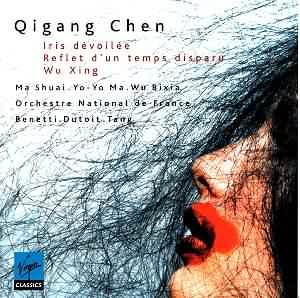Qigang Chen, now in his early fifties, is an exact contemporary
of Zhou Long and Chen Yi whose music features in a recent BIS disc (Oriental
Landscapes –
BIS CD-1222) that I reviewed recently. Like his colleagues, he was
a victim of the so-called Cultural Revolution aiming – ironically enough
– at getting rid of China’s extraordinarily rich cultural past. He too
migrated to the West, landed in Paris and became Messiaen’s last pupil
during the period 1984-1988. Messiaen’s influence may certainly be heard
in the works recorded here although, like his colleagues, he too strives
for reconciliation of his Eastern heritage and his Western musical education
without either bluntly imitating Messiaen or falling into the trap of
fake Orientalism. His music actually draws on both sides of his cultural
background, and all the pieces here attempt a synthesis of East and West
in a musical way. From this point of view, the most recent and most substantial
work Iris dévoilée may be the most successful
and, to a certain extent, consolidates Qigang’s stylistic journey. This
large-scale score calls for three female soloists including a Beijing
opera singer, three traditional Chinese instruments (actually the same
as featured in Zhou Long’s Out of Tang Court recently reviewed)
and large symphony orchestra. Its nine movements represent nine facets
of what Frenchmen call l’éternel féminin. Interestingly
enough, the Chinese text is sung or declaimed in traditional fashion by
the Beijing opera singer whereas the ‘classical’ sopranos sing wordless
vocalises. The piece unfolds slowly alternating tranquil, angry or whimsical
women’s portraits. This predominantly slow, often dreamy score, however,
has its more animated moments such as in Libertine (redolent of
The Fire in Ravel’s L’enfant et les sortilèges),
in Jealous and, of course, in the histrionics of Hysterical.
The piece, however, ends with a long ecstatic movement of great beauty.
The music, subtly scored and refined, often calls Messiaen to mind (especially
the love music of his Turangalîla) but also has echoes
from Ravel or Debussy. The traditional singer and instruments lend the
music its highly personal tone. I find this a really beautiful piece though
I suspect that some might find it ‘too pretty’ for its own good.
The almost Proustian title of Reflet d’un temps
disparu fairly describes what the music is about. It is actually
based on an old Chinese melody slowly explored and mused upon in the
dialogue between cello and orchestra. This very attractive, mildly nostalgic
piece is cast as a simple arch form slowly building-up towards a massive
climax before retracing its way back into silence.
Wu Xing ("The Five Elements")
is a short orchestral suite of clearly contrasting movements evoking
the five elements which, according to Chinese tradition, constitute
the universe. This is another fine work fully demonstrating Qigang’s
remarkable orchestral flair.
As far as I can judge, these often beautiful works
receive superb readings from all concerned and the live recorded sound
is quite good indeed. Needless to say that Qigang’s music was new to
me; but I for one loved its refinement and subtlety enormously. I do
not know what his other works may sound like, but I would definitely
want to hear more of it.
Hubert Culot
| Error processing SSI file
|
